A curriculum vitae (CV) is a resume used by job seekers, including academics like archaeologists. While a general summary emphasizes a person’s work experience and skills relevant to the job, a CV places an equal focus on academic achievements and work history. A CV is usually longer than a resume.
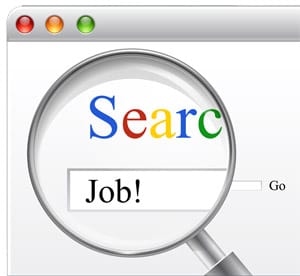
Archaeology CV Example
[Full Name] [Address] [Phone number] [Email]
Objective: An experienced archaeologist with a passion for uncovering and interpreting the past. Seeking a challenging and rewarding role in the field of archaeology.
Education:
- Master of Arts in Archaeology, University of Cambridge, 20XX-20XX
- Bachelor of Arts in Anthropology, University of California, Los Angeles, 20XX-20XX
Skills:
- Proficient in excavation techniques and fieldwork methodology
- Skilled in artifact analysis and interpretation
- Experienced in laboratory analysis, including artifact cleaning, cataloguing, and preservation
- Strong research and writing skills, including academic publications and grant applications
- Proficient in GIS and other digital mapping tools
- Excellent communication and interpersonal skills, including experience in public outreach and education
Experience:
- Lead Archaeologist, XYZ Archaeology Firm, Los Angeles, CA, 20XX-present
- Field Archaeologist, ABC Research Institute, New York, NY, 20XX-20XX
- Laboratory Technician, Museum of Anthropology, San Francisco, CA, 20XX-20XX
Publications:
- “Interpreting Stone Tool Technology at the XYZ Site,” Journal of Archaeological Science, 20XX
- “The Role of the XYZ Site in Understanding the Early Human Occupation of North America,” American Antiquity, 20XX
Certifications:
- Registered Professional Archaeologist (RPA)
- OSHA 40-hour HAZWOPER Certification
Professional Memberships:
- Society for American Archaeology (SAA)
- Archaeological Institute of America (AIA)
References: Available upon request.
Download archaeology resume examples.
Archaeology Resume example:
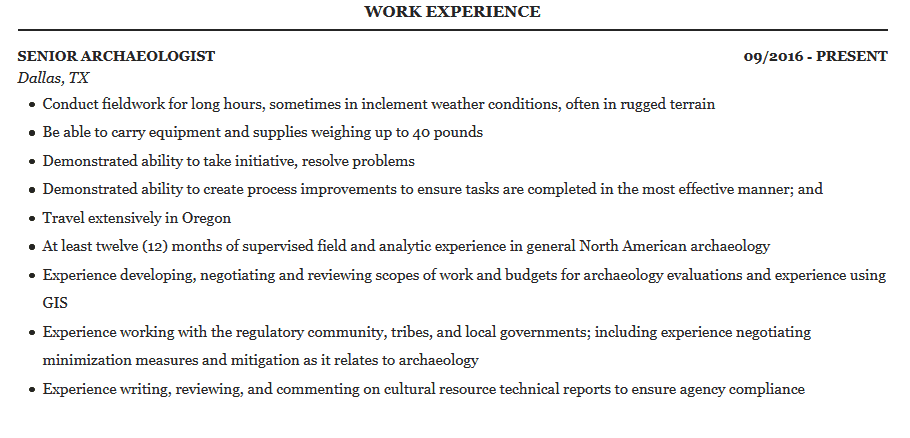
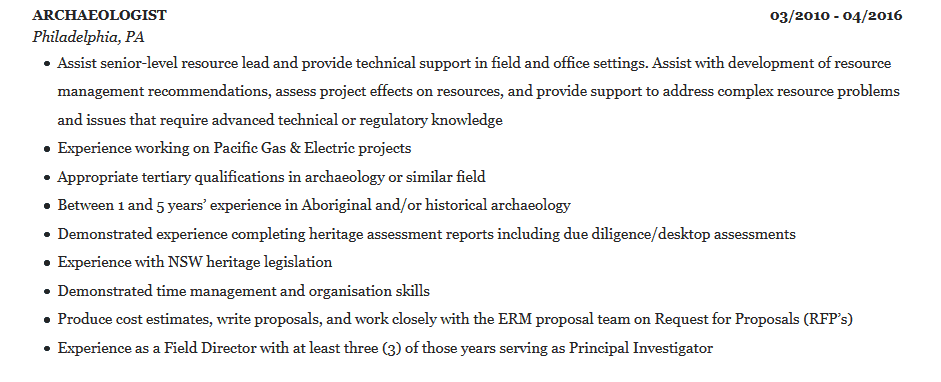
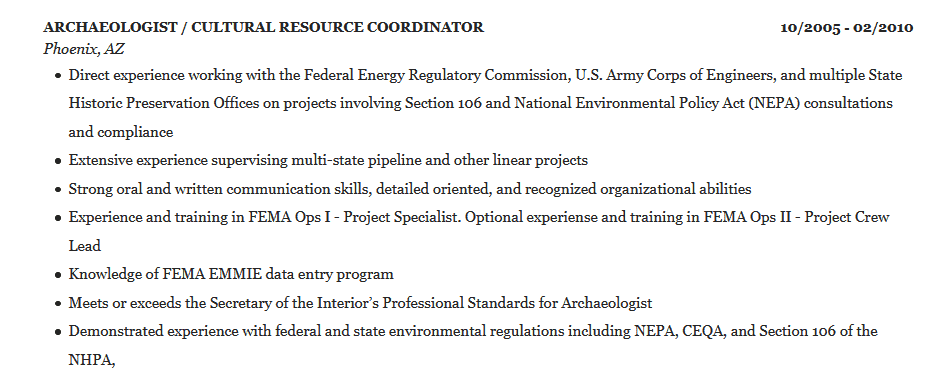
Every CV has a similar general structure and format, but its educational background and job profile differ. To write a CV for an archaeologist or archaeology professor’s position, you must first plan it per your experience and qualifications. Then, follow the standard formatting and editing criteria.
Let us see a video example with organizational tips and what kind of information to include in the Archaeology CV:
Archaeology CV Skills List
- Excavation techniques and fieldwork methodology
- Artifact analysis and interpretation
- Laboratory analysis, including artifact cleaning, cataloging, and preservation
- Research and writing skills, including academic publications and grant applications
- GIS and other digital mapping tools
- Communication and interpersonal skills, including public outreach and education
- Time management and organizational skills
- Attention to detail and accuracy
- Critical thinking and problem-solving skills
- Knowledge of archaeological theory and methodology
- Understanding of local and federal regulations related to cultural resources management
- Ability to work collaboratively with a team of archaeologists and other professionals
- Ability to work independently with minimal supervision
- Flexibility and adaptability to changing field conditions and work environments
- Foreign language proficiency, especially in languages relevant to the area of research.
Below is a step-by-step procedure for writing an archaeology CV:
Research and Plan
Before writing your CV, check out the archaeology jobs suitable to your profile. This sets the foundation for planning your CV. Most archaeology CVs list the following parts: education, research, honors, laboratory/ field experience, teaching, publications, grants, organizational affiliations, and conference presentations. The additional features may include your volunteer experiences.
Planning a CV can appear complicated if you have too much information to provide. In that case, you may do away with a few categories like grants or others that may not be relevant to the job. Once you have planned all the parts of your CV, you must lay out the information in reverse chronological order.
Format
Formatting a CV is essential as it gives the first impression to the prospective employer. A well-formatted CV is easy to read, skim through, and understand. If an employer likes your CV at first glance, they are likelier to go through it in detail. While you do not have to write your CV like an expert document designer, certain things must be kept in mind. These are:
- Use a readable font and 11- or 12-point size for the text of the CV.
- Ensure that your name and significant headings (category names) are prominent in the CV. These may be in bold format and slightly larger than the rest of the text.

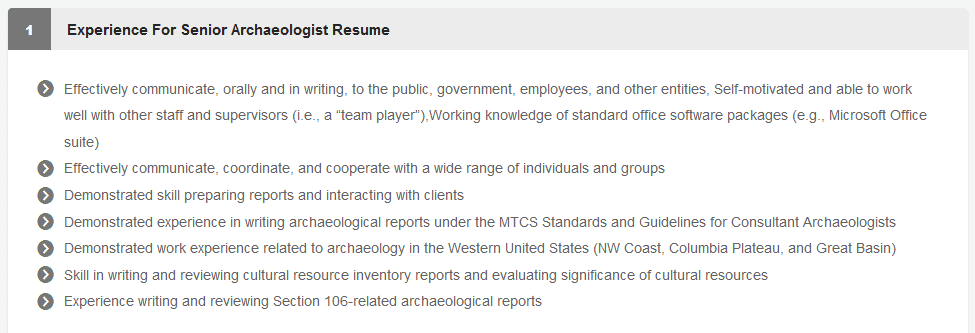
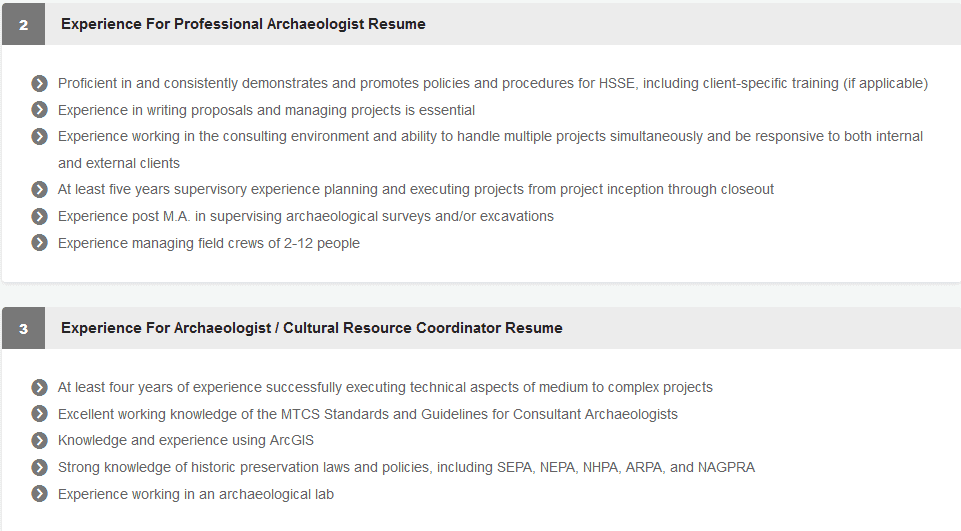
Edit
This is another crucial step in creating a good CV. It is vital to thoroughly proofread your CV before sending it to potential employers. Grammatical or spelling errors make a terrible impression, significantly if the candidate has advanced degrees. Alternatively, you may get your CV checked by your colleague or professor. Experienced professionals can give valuable suggestions to enhance the content and structure of your CV.
Make it Job-specific
Every time you apply for a job, you must review your CV to confirm that it aligns with the desired job post. For instance, if you plan to use an academic position at a college or university that gives field experience preference, you should place your field experience on the first page just below the education part. This way, the employer can see what makes you eligible for the job.
